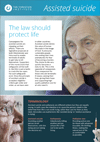Allowing assisted suicide for a few individuals would put the great majority of vulnerable people at risk of harm, warns a top barrister and Peer.
Lord Carlile of Berriew QC says Parliament must consider the subject carefully without being “stampeded by highly emotional campaigns mounted by single-issue pressure groups”.
His comments come in a letter to The Times, written in response to news that Lord Joffe intends to make another attempt to legalise assisted suicide.
Writing last week, also in The Times, Lord Joffe claimed that opposition to his 2005 bid was largely stirred up by “the influence of religious leaders”.
But Lord Carlile argues that “the real concern was, and remains, public safety – the potential for collateral harm to the great majority of terminally ill people from giving a few individuals a ‘right’ to prescription suicide pills”.
He writes that the safeguards in Lord Joffe’s 2005 Bill were “paper-thin”, but adds that even if worded carefully, any change in the law could be open to exploitation.
“Laws aren’t like precision-guided missiles,” he writes. “Once a statute, they can quickly be used to encourage acts they were designed to enable and control.
“It’s easy enough to draft safeguards in the comfort of Westminster, but laws have to be real-world-proofed.”
He warns that there is not enough evidence to guarantee that changing the law would be safe.
“Already,” he points out, “in advance of another assisted dying Bill, we are hearing suggestions that people with dementia should consider whether they are a burden on their families.”
In September Baroness Warnock, an influential moral philosopher, sparked renewed debate over euthanasia when she suggested that elderly dementia sufferers should consider whether or not they have a “duty to die”.
“The slippery slope,” says Lord Carlile, “is no fiction: it is already well polished.”
“This is not about religion or autonomy or medicine: it is about public safety, legal certainty and the protection by the law of the vulnerable.”

